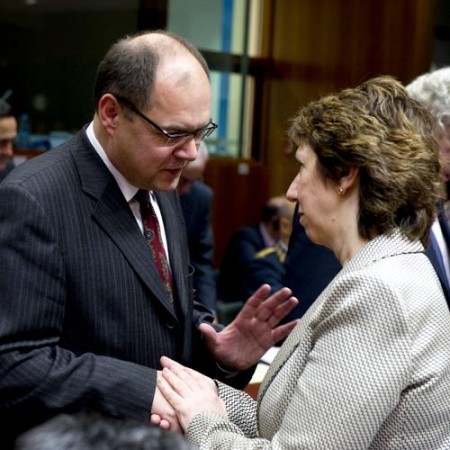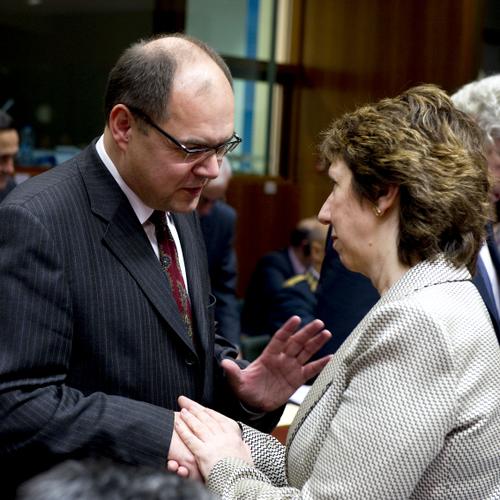How the nomination of the EDA director failed (in the first round)

(BRUSSELS2) Normally, the replacement of the new director for the European Defense Agency should go like clockwork. The post had been vacant since the end of September. A candidate had been put forward by the High Representative of the EU for Foreign Affairs and Common Security Policy, who offered a number of guarantees of professionalism and independence. The written procedure was initiated. But, wham! In this padded world, on the borders of diplomacy and defence, and contrary to custom, this appointment did not receive the full consensus of the 26 member states of the Agency. At least one, Italy, which also had a candidate, felt that it had not been widely consulted. And others have followed suit. Sign of a growing malaise...
The bronca broods before the Council
What seemed to be in question did not seem to be so much the personality of the person (Claude-France Arnoult) approached by Cathy Ashton. Several States thus considered that the High Representative had a cavalier way of treating them. The way of behaving which can be summed up, as a witness to the meeting told me: "I am the president of the Agency, I have the right to propose a candidate" has offended certain countries. The formulation of his proposal "in consultation with several Member States" set fire to the powder. The elastic was tight. And the return was the height. The High Representative was sent back to the ropes (as we say in boxing). Because it is not only Italy which has gone to the front, but above all Germany. And, rather violently it seems...
The German minister writes
A few days before the Council (December 7), the Minister of Defense, zu Gutenberg, indeed split a letter which put, formally, the dots on the “i”. He insisted on two points.
First, the need for a "partner" (Vertrauen) between the new head of the Agency and the Member States. In the wake of the informal Council of Ghent, a European Defense agency "operational" East "one of the keys" to allow "to intensify cooperation and improve the sharing of tasks in European security policy“he specifies (*).
Second argument: the need for a "transparency" in the appointment procedure. The request "of our Italian colleague shows that there are still questions regarding what is the basis of this confidence. (...) The criticism of the lack of transparency in the selection procedure is on the table and risks skewing the discussion and causing substantial risks in the management of the Agency" specifies the letter. The minister then proposes to suspend the formal vote and "pleads for resuming the nomination process in order to allow full time for consultation of the Member States".
The vote, the vote, the vote
Zu Gutenberg's letter had apparently not been approved by the Foreign Minister in Berlin. And Me Ashton did not fail to notice it, in her own way... Is it a mistake or the desire to mark the occasion. Still, it was not zu Gutenberg who received the response from the High Representative. But his colleague Westerwelle. The two not being on the same political side - one CDU-CSU, the other Liberal - even if they participate in the same coalition in power, it was to add salt to the wound. This "switching" error also constitutes a revealing slip of the tongue for not wanting to consider the Ministers of Defense in their own right.
During the Council, Cathy Ashton nevertheless wanted, at all costs, to vote. Germany and Italy then reared. And the qualified majority risked not being reached. It was then the French Minister, Alain Juppé, who stepped in, proposing a compromise solution, which was finally accepted. We left time to time. With a new informal consultation procedure that would last until 21 December. And a new written procedure to allow the new director of the Agency to be operational at the start of 2011.
Comments : we can have several interpretations of this attitude. Willingness to show its predominance, unpreparedness of the Council, underestimation of resistance, self-sabotage... Be that as it may, the maneuver failed. And the High Representative appeared weaker than she is in this "Defence" Council which was to be her consecration. We thus understand that she insisted that the press conference of the Agency be also canceled and that she did not want to pour herself out. Thus perpetuating what has now become its trademark: communicating as badly and as little as possible. In doing so, it also demonstrates both its ignorance but also its lack of interest in questions of defense and European security. Which is a strategic mistake. The question of his replacement, as mentioned by one of the delegations around the table, will begin to arise if, in the coming months, a little more enthusiasm and initiative do not counterbalance the many reluctance of the High Representative on the PeSDC.
(*) free translation of the letter written in German.
Read also:
